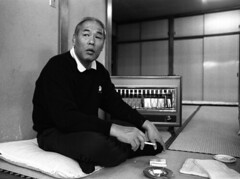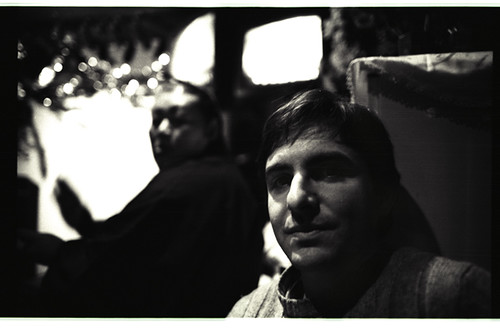A Chat With the Oyakata

THE OYAKATA, AT THE STABLE
At three o'clock, I arrived at the Oyakata's office, the same place that Usuda brought me to weeks ago when I moved into the stable. I saw the Oyakata marking up papers at his desk in the back of the room.
"My name is Jacob," I told the receptionist by the door. "I have an appointment with Hanaregomo Oyakata."
She asked me to wait and walked to the back of the room, where I saw her say something to the Oyakata. He looked up and waved me back toward him.
"Happy New Year," I said when I reached his desk.
"Uh, happy New Year," he responded, sounding like he'd forgotten that the previous year had ended so recently. He motioned for me to sit down in the chair in front of his desk. "You have a beard," he said with the trace of a grin.
"I actually shaved before I entered the stable," I explained. "I thought I'd be putting on a mawashi more often and I'd never seen a sumo wrestler with a beard…until I saw that big Eastern European guy at the practice this morning."
"Oh, you were there?" he said. "You must be thinking of Kokkai. He's from Georgia."
Meanwhile, the receptionist had brought each of us a plastic cup of coffee set in a reusable rubber holder with a handle. The Oyakata sipped his and lit a cigarette. I ignored mine, still wired from the coffee I drank at McDonald's while checking my email and at the café while awaiting my appointment with the Oyakata. I started in with my questions about how he became a sumo wrestler.
It turned out that he entered the sport reluctantly. As a 19-year-old, he was happily enrolled in college in his hometown in Yamaguchi prefecture, where he studied law and wrestled on the judo team, but his parents had other ideas for him.
"They said, 'Go, give sumo a try," he said. "I didn't want to, but I didn't have a choice: they weren't going to pay my college tuition anymore."
I asked him why his parents wanted him to be a sumo wrestler so badly, while the receptionist, seeing my untouched cup of coffee, replaced it with a mug of green tea.
"My father loved sumo," he answered, and left it at that.
He entered Hanakago stable, not far from where he would later establish his own Hanaregoma stable. Stable life, he told me, was actually easier than life as a student athlete. In college, he said, his judo training sessions were just as intense as sumo practice in the stable, and he had to spend nearly the same amount of time looking after his senpai and helping cook meals in the house that the judo team shared. But when he was a student, he had schoolwork to do on top of all this; as a wrestler, he spent the afternoons napping and his evenings relaxing with his stablemates.
He spent 12 years wrestling with the stable, eventually reaching ozeki rank and becoming, it seems, a household name. Whenever I tell people here that I stayed in the stable run by the former ozeki Kaiketsu, they know exactly who I'm talking about and are deeply impressed, assuming they're old enough to have been paying attention to sumo when he was active in the 1970's.
As Kaiketsu, the Oyakata had a reputation as a solid, hardworking wrestler, I later learned from David Shapiro, an English-language sumo announcer on Japan's public television network and the author of a book on sumo. Kaiketsu was demoted from ozeki after losing a series of matches that he fought with an injury, but was one of the few wrestlers to have ever lost and then regained that rank. "He was famous for saying that dropping out of a match because of an injury was the same throwing a match," Shapiro later told me. "The entire nation loved that."
At the end of each tournament, a series of awards are handed to wrestlers in each division for the most wins, best technique, and so on. Kaiketsu won the kantosho award for fighting spirit seven times in his career. I don't know if that's a record, but I couldn't find any wrestlers who had won it more times.
In 1979, when he was 31, Kaiketsu retired from wrestling and became Hanaregoma Oyakata. He started his stable two years later. Not all oyakata have their own stable—some help coach at others' stables or have roles in administering the sumo association—but all stablemasters must be oyakata.
I asked the Oyakata why he wanted his own stable, and he looked at me like I'd asked the most naïve question imaginable. "I knew when I stopped sumo that I wanted to bring up wrestlers," he said. "It's a natural feeling—everyone feels like that. And even if you can't start your own stable, you want to remain involved with sumo."
The Oyakata even had a yokozuna come out of his stable. I didn't know it at the time, but one of the oyakata that came to the stable with his wrestlers weeks earlier—the rotund one I joked looked a little like a mobster—was the former yokozuna Onokuni, who wrestled in the 1980's.
Shapiro later told me that the Oyakata is now known for his competence as the head of the sumo association's busy public relations office. This has its downside, since it discourages the association's executives from rotating him into a less time-consuming post. "He's so busy that it's hard for him to recruit and difficult for him to train his guys the way he wants to train them," Shapiro said.
I had actually also asked the Oyakata about how he does his recruiting. He said he has friends all over the country who nominate wrestlers for his stable. He follows up with a phone call or a visit.
"I look for tall people; I look at whether they've done sports," he said. "But even if they've never played sports, if they really want to do sumo, it's okay. The most important thing is that they'll put their hearts into it."
His own experience—and, for that matter, that of Haruki—notwithstanding, the Oyakata said he's not interested in wrestlers whose parents pressure them to join. "It's got to be their own choice," he said.
But when the Oyakata finds someone he really wants in his stable, he'll sometimes spend years, as he did with Kazuya, trying to convince him to join, he said. "I tell them about the sumo life and how it will make them strong," he told me.
Yet, in today's Japan, with so many other, easier paths leading to clearer rewards, getting new wrestlers to join the stable is difficult, he said. "There are a lot of stables and so few people out there who want to join," the Oyakata said. "Everyone thinks sumo life is hard and exhausting, and they know they'll probably never make it far enough to become famous or earn much money."
I wondered if the difficulty of recruiting varied at all with the economy. Maybe, I reasoned, it was easier for him to find new wrestlers at the start of his tenure as an oyakata, before Japan's affluent "bubble economy" exposed the infinite number of easier ways to get by. And now perhaps it was getting easier for him to recruit again, since the start of the country's recession.
But this wasn't the case. "It' been difficult the whole time," he said. "It was difficult then; it's difficult now."
I'd been talking to the Oyakata for less than 30 minutes at this point and had already worked through most of my questions. The Oyakata, it turned out, was a man of few words. He'd answered my questions succinctly, but not always satisfactorily. It still wasn't entirely clear to me how he convinces wrestlers to join his stable, for instance. I'd also asked him what wrestlers from his stable have done after retiring from the sport. "Some of them work for companies. Some of them start companies," was his answer.
The Oyakata was not cagey, but he sure was vague.
I tried to think of questions that might get him to talk a little more. "How does it feel when one of your wrestlers wins a match?" I asked.
"When someone is successful, it feels good," he said. "When they lose, it's terrible."
"How about when you see one of your guys advance up the banzuke?" I pushed a little more.
"I'm always glad when they are promoted," he said. "But I'm nervous they'll come back down."
I decided to take one more shot at getting him to open up a bit before surrendering. "How do you feel about your wrestlers now, with the tournament about to start?" I asked.
"Everyone just had a long break," he said. The wrestlers had finished their four-day New Year's break two days ago. "Now I really feel like no one is working hard enough."
I realized I wasn't going to get much more out of him and decided to wrap up our interview there. I just had two more questions I was saving until the end.
"There's one more thing I wanted to ask," I started. "I've been wondering how the atmosphere at the stable might be different during the tournament. Do you think it might be okay for me to come back for a few nights once the tournament starts up?"
"Sure," he answered with as much forethought as if I'd merely asked him to break a dollar. "You've just got to understand one thing: no two stables are alike. Ours is on the small side—I mean, the building itself is small—and you shouldn't walk away with the idea that all stables are like that."
"Got it," I said. "I really appreciate it." I'd been kicking myself the past couple days for leaving the stable before the tournament and was grateful for the chance to return. But I still wanted to ask one last thing. "You know, actually, I did have another question for you, if you don't mind."
He nodded.
"What do your kids call you?" I asked.
"What?" he said, looking confused.
"It's kind of interesting to me how you were born with one name, then wrestled under a different name, and now are known as Hanaregoma Oyakata," I said. "So I was wondering: What do your kids call you?"
"They call me 'Dad,'" he answered.
NEXT: The Photo Hall



<< Home